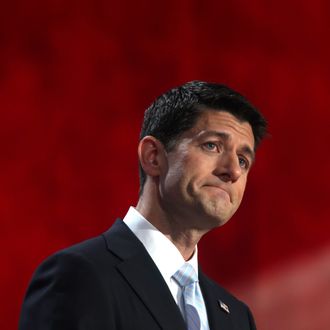
In his vacuous, sloganeering speech today at CPAC, Paul Ryan argued that “the left” — the term he used to describe not the actual left, but the Obama administration — offers Americans “a full stomach — and an empty soul.” What soul-emptying ways is “the left” filling people’s stomachs? Ryan has a story from his fellow Republican, Eloise Anderson:
>She once met a young boy from a poor family. And every day at school, he would get a free lunch from a government program. But he told Eloise he didn’t want a free lunch. He wanted his own lunch — one in a brown-paper bag just like the other kids’. He wanted one, he said, because he knew a kid with a brown-paper bag had someone who cared for him.
Okay, fine. Some kid would rather have his parents pack him a lunch than get it for free at school. Most kids would also rather have their parents drive them to school and drop them off than ride the bus. But just as not every child has a parent who can drive them to school, not every kid has parents who can afford to give them lunches every day. That’s why “the left” supports things like school buses and free and reduced-price school lunches. Because a free bus ride and a free lunch may not be the best possible way to transport and feed children, but it’s better than nothing.
Ryan’s plan is to reduce funding for the school lunch program. So more kids will have empty stomachs, but their souls will be full.
Update: In the post above, I assumed that the basic anecdote recounted by Ryan is factually correct, which is total journalistic malpractice. Via Wonkette, the school lunch story appears to have been recycled from a story and altered beyond recognition in the process. The original story had nothing to do with a child turning down a free lunch. It’s about a kid, Maurice Mazyck, who met a private benefactor, Laura, asking to literally have his lunch placed in a brown paper bag:
“Look, Maurice, I don’t want you out there hungry on the nights I don’t see you, so this is what we can do. I can either give you some money for the week–and you’ll have to be really careful about how you spend it–or when you come over on Monday night we can go to the supermarket and I can buy all the things you like to eat and make you lunch for the week. I’ll leave it wih the doormen, and you can pick it up on the way to school.”
Maurice looked at me and asked me a question.
“If you make me lunch,” he said, “will you put it in a brown paper bag?”
I didn’t really understand the question. “Do you want it in a brown paper bag?” I asked. “Or how would you prefer it?”
“Miss Laura,” he said, “I don’t want your money. I want my lunch in a brown paper bag.”
“Okay, sure. But why do you want it in a bag?”
“Because when I see kids come to school with their lunch in a paper bag, that means someone cares about them. Miss Laura, can I please have my lunch in a paper bag?”
Now, it’s possible Eloise Anderson met some other poor child who also has a paper bag fetish. But it sure looks like a game of Republican telephone where a poor child with a specific request for a woman helping him was conveniently transformed into a victim of the school lunch program.
Second update: Via Glenn Kessler, Anderson told this story before Ryan’s last July 31st. Anderson, per the transcript, told Ryan’s committee:
My thought has always been around the SNAP program even when it was called “food stamps” is, why do you have this program, school program, school breakfast, school lunch, school dinner, when do we start asking parents to be responsible for their children?
You know, a little boy told me once that what was important to him is that he didn’t want school lunch, he wanted a brown bag because the brown bag that he brought with his lunch in it meant that his mom cared about him. Just think what we have done. If this kid tells me a brown bag was more important than a free lunch, we’ve missed the whole notion of parents being there for their children because we’ve taken over that responsibility, and I think we need to be very careful about how we provide programs to families that don’t undermine families’ responsibilities.
It sure looks like Anderson turned the story “An Invisible Thread” – about a New York City boy – into a child she met who scorned his government-provided school lunch. Or else she happened to meet a kid who said the exact same thing as the boy in “An Invisible Thread.” It’s also interesting that Anderson’s conclusion from the (probably fake) story is that the school lunch program makes parents into lazy slackers, while Ryan’s conclusion is that it robs children of their soul.
Third update: Anderson’s spokesperson tells Kessler she “misspoke” – “Secretary Anderson was referring to a television interview which she had seen with Maurice Mazyck.” So, by mistake she somehow believed the interview she saw on television was a conversation that happened with her personally, and that the boy’s request for a paper bag lunch was actually a request not to get a school lunch.
Anderson seems like the real source of blame here – it’s hard to completely fault Ryan for believing the testimony of a public official.






























